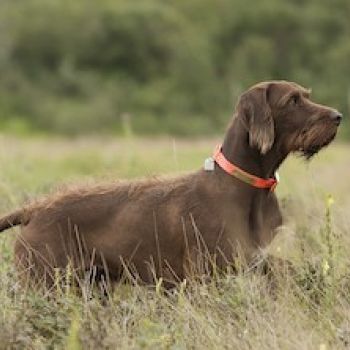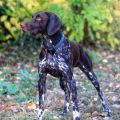The Pudelpointer is a versatile and intelligent dog breed that is highly regarded for its exceptional hunting abilities. This breed is a cross between a Poodle and a Pointer, resulting in a dog that possesses the best qualities of both parent breeds. With a strong and muscular build, the Pudelpointer is well-suited for various tasks, including hunting, tracking, and retrieving. This breed is known for its exceptional scenting abilities, endurance, and determination, making it a popular choice among hunters and outdoor enthusiasts.
The history of the Pudelpointer can be traced back to the late 19th century in Germany. The breed was developed by a German breeder named Baron von Zedlitz und Neukirch, who aimed to create a versatile hunting dog that could excel in both land and water. To achieve this, he crossed a German hunting Poodle with an English Pointer. The result was a dog that possessed the intelligence and trainability of the Poodle, combined with the athleticism and hunting instincts of the Pointer.
According to the FCI (Fédération Cynologique Internationale) typology, the Pudelpointer belongs to Group 7 - Pointing Dogs. This group includes various breeds that are primarily used for hunting and pointing game. The Pudelpointer is classified under Section 1 - Continental Pointing Dogs, which includes breeds originating from Europe.
The Pudelpointer is primarily bred for hunting purposes and is highly valued for its versatility in the field. This breed is known for its exceptional pointing and retrieving skills, making it an excellent choice for upland game hunting. Additionally, the Pudelpointer's ability to track and retrieve waterfowl makes it a valuable asset for waterfowl hunting as well. These dogs are highly trainable and eager to please, making them suitable for both novice and experienced hunters.
In terms of physical characteristics, the Pudelpointer is a medium to large-sized dog breed. Males typically weigh between 55 to 70 pounds (25 to 32 kg), while females weigh slightly less, ranging from 45 to 60 pounds (20 to 27 kg). The height at the shoulder for males is around 24 to 26 inches (61 to 66 cm), and for females, it is slightly smaller, ranging from 22 to 24 inches (56 to 61 cm).
The Pudelpointer has a well-muscled and athletic build, with a deep chest and strong legs. The breed's coat is dense, weather-resistant, and can come in various colors, including liver, black, or shades of brown. The coat is typically medium in length and can be either wavy or curly. Regular grooming is required to maintain the coat's condition and prevent matting.
In terms of temperament, the Pudelpointer is known for its intelligence, loyalty, and trainability. These dogs are highly adaptable and can easily transition from being a hunting companion to a family pet. They are generally friendly and affectionate towards their owners and are known to be good with children. However, early socialization and training are essential to ensure they develop into well-rounded and obedient dogs.
The average lifespan of a Pudelpointer is around 12 to 14 years, which is relatively long compared to other dog breeds of similar size. However, like all breeds, they can be prone to certain health issues, including hip dysplasia, progressive retinal atrophy, and allergies. Regular exercise, a balanced diet, and routine veterinary care are crucial to maintaining their overall health and well-being.
One interesting fact about the Pudelpointer is its exceptional scenting abilities. These dogs have a keen sense of smell, which allows them to track and locate game with remarkable accuracy. Their ability to point and hold game until the hunter arrives is highly valued in the field. Additionally, the Pudelpointer's webbed feet and water-resistant coat make it an excellent swimmer, enabling it to retrieve waterfowl from lakes and rivers.
In conclusion, the Pudelpointer is a remarkable dog breed that combines the intelligence and trainability of the Poodle with the athleticism and hunting instincts of the Pointer. With its versatile hunting abilities, friendly temperament, and adaptability, the Pudelpointer is an excellent choice for hunters and outdoor enthusiasts alike. Whether in the field or as a beloved family pet, this breed excels in various roles and is sure to bring joy and companionship to its owners.

The Pudelpointer is a remarkable breed of dog known for its exceptional character and versatile abilities. With a combination of intelligence, loyalty, and a strong work ethic, these dogs make excellent companions and working partners. In this text, we will delve into the character of Pudelpointer dogs, their behavior, and how to raise and train them effectively.
Pudelpointers are highly intelligent dogs, which contributes to their trainability and adaptability. They possess a keen sense of observation and are quick to learn new commands and tasks. This breed is known for its strong desire to please its owner, making them highly responsive to training. Their intelligence also allows them to excel in various activities such as hunting, tracking, and obedience trials.
One of the most notable traits of Pudelpointers is their unwavering loyalty and devotion to their family. They form strong bonds with their owners and are known to be affectionate and gentle. This breed thrives on human companionship and does not do well when left alone for extended periods. They are happiest when they are included in family activities and given plenty of attention and affection.
Pudelpointers are known for their calm and composed demeanor. They have a stable temperament, which makes them excellent family dogs. They are generally good with children and other pets when properly socialized from an early age. However, it is important to note that individual personalities may vary, and early socialization and training are crucial to ensure a well-rounded and well-behaved dog.
As a hunting breed, Pudelpointers possess a strong prey drive and a natural instinct for tracking and retrieving. They are versatile hunters, excelling in both upland game and waterfowl hunting. Their exceptional scenting abilities, combined with their athleticism and endurance, make them highly sought after by hunters. However, it is important to channel their energy and instincts appropriately through regular exercise and mental stimulation.
When it comes to raising and training a Pudelpointer, consistency and positive reinforcement are key. These dogs respond best to reward-based training methods, such as treats, praise, and play. Harsh or punitive training techniques should be avoided as they can damage the trust and bond between the dog and its owner. Early socialization is crucial to expose the Pudelpointer to various people, animals, and environments, ensuring they grow up to be well-rounded and confident dogs.
Regular exercise is essential for Pudelpointers to maintain their physical and mental well-being. They require daily walks, runs, or play sessions to burn off their energy. Engaging in activities that stimulate their natural instincts, such as retrieving or scent work, can provide mental enrichment and prevent boredom.
In conclusion, Pudelpointers are intelligent, loyal, and versatile dogs with a calm and composed demeanor. They thrive on human companionship and are highly trainable. With proper socialization, training, and exercise, Pudelpointers make excellent family pets and working partners. Their exceptional character and abilities make them a cherished breed among dog enthusiasts worldwide.
The Pudelpointer is a versatile and intelligent breed that requires proper care to ensure their well-being and happiness. Here is an extensive description of recommended care for Pudelpointer dogs, along with tips on what to do and what not to do when caring for dogs of this breed.
1. Exercise: Pudelpointers are active dogs that require regular exercise to stay healthy and mentally stimulated. Aim for at least 60-90 minutes of exercise daily, including walks, runs, and playtime. Engage them in activities like retrieving, swimming, or agility training to satisfy their natural hunting instincts.
2. Mental Stimulation: These dogs are highly intelligent and thrive on mental challenges. Provide them with puzzle toys, interactive games, and obedience training sessions to keep their minds sharp. Mental stimulation helps prevent boredom and destructive behaviors.
3. Grooming: Pudelpointers have a dense, wiry coat that requires regular grooming. Brush their coat at least once a week to remove loose hair and prevent matting. They are considered a low-shedding breed, making them suitable for people with allergies. Regular bathing should be done every 6-8 weeks or as needed.
4. Diet: Feed your Pudelpointer a high-quality, balanced diet that suits their age, size, and activity level. Consult with your veterinarian to determine the appropriate portion sizes and feeding schedule. Avoid overfeeding to prevent obesity, as this can lead to various health issues.
5. Health Care: Regular veterinary check-ups are essential to ensure your Pudelpointer's overall health. Vaccinations, parasite prevention, dental care, and annual blood work should be part of their routine healthcare. Additionally, be aware of breed-specific health concerns such as hip dysplasia, progressive retinal atrophy, and allergies.
6. Socialization: Pudelpointers are known for their friendly and sociable nature. Early socialization is crucial to help them develop good behavior around people, other animals, and different environments. Expose them to various situations, sounds, and experiences from a young age to prevent fear or aggression issues.
7. Training: Pudelpointers are highly trainable and eager to please. Use positive reinforcement techniques such as treats, praise, and rewards to train them effectively. Consistency, patience, and firmness are key when teaching commands, obedience, and good manners.
8. Safety: Pudelpointers have a strong prey drive, so it's important to keep them on a leash or in a securely fenced area during outdoor activities. Ensure your home and yard are dog-proofed, removing any potential hazards or toxic substances. Provide them with a comfortable and safe sleeping area.
What to do:
- Provide regular exercise and mental stimulation.
- Groom their coat regularly to maintain its condition.
- Feed a balanced diet suitable for their needs.
- Schedule regular veterinary check-ups and vaccinations.
- Socialize them from an early age to ensure good behavior.
- Use positive reinforcement training techniques.
- Keep them safe and secure during outdoor activities.
What not to do:
- Neglect their exercise and mental stimulation needs.
- Ignore grooming, leading to matting or skin issues.
- Overfeed or feed an inappropriate diet.
- Neglect regular veterinary care and vaccinations.
- Isolate them from social interactions and experiences.
- Use harsh training methods or punishment.
- Allow them to roam freely in unsafe areas.
Remember, Pudelpointers are loyal and loving companions that thrive with proper care, attention, and training. By following these tips, you can ensure a happy and healthy life for your Pudelpointer.
The Pudelpointer is a remarkable breed of dog known for its unique and captivating appearance. When it comes to their common color, these dogs exhibit a stunning array of shades and patterns that truly make them stand out from the crowd.
The most prevalent color seen in Pudelpointers is a rich and lustrous liver, which is often referred to as chocolate brown. This deep and velvety hue covers the majority of their body, creating a striking contrast against their expressive eyes and other features. The liver coloration is typically uniform throughout, with no noticeable variations or markings.
However, it is not uncommon to find Pudelpointers with small patches or speckles of white on their chest or toes. These white markings add a touch of elegance to their overall appearance, creating a harmonious balance between the dominant liver color and the contrasting white accents.
In some cases, Pudelpointers may also exhibit a unique color pattern known as roan. Roan is characterized by a mixture of white and liver hairs evenly distributed throughout the coat, creating a beautiful speckled effect. This pattern can vary in intensity, with some dogs displaying a more subtle roan while others have a more pronounced and eye-catching appearance.
Another variation of the Pudelpointer's coloration is the presence of ticking. Ticking refers to small spots or flecks of liver color scattered across a predominantly white coat. This creates a mesmerizing and intricate pattern that adds depth and texture to their overall appearance.
It is important to note that while liver is the most common color seen in Pudelpointers, there are other acceptable colors within the breed standard. These include black, which is less common but equally striking, and variations of liver and white combinations.
In conclusion, the common color of Pudelpointer dogs is a rich and captivating liver, often accompanied by small patches or speckles of white. This coloration creates a visually stunning and unique appearance that truly sets them apart. Whether it's the deep chocolate brown, the mesmerizing roan pattern, or the intricate ticking, Pudelpointers are undeniably a breed with a color palette that captures the attention and admiration of all who encounter them.
The Pudelpointer is a versatile and athletic breed of dog that is known for its exceptional hunting abilities and loyal nature. When it comes to their health, Pudelpointers are generally considered to be a robust and healthy breed. However, like all dogs, they are still prone to certain health issues that owners should be aware of in order to provide the best care possible.
One of the most common health concerns in Pudelpointers is hip dysplasia. This is a genetic condition where the hip joint does not develop properly, leading to pain, lameness, and arthritis. Responsible breeders will perform hip evaluations on their breeding dogs to minimize the risk of passing on this condition. Regular exercise, a balanced diet, and maintaining a healthy weight can also help reduce the risk of hip dysplasia.
Another common health issue in Pudelpointers is progressive retinal atrophy (PRA). This is a degenerative eye disease that eventually leads to blindness. PRA is also a hereditary condition, and responsible breeders will perform eye examinations on their breeding dogs to ensure they are free from this condition. Regular eye check-ups with a veterinarian are essential to catch any signs of PRA early on.
Pudelpointers are also prone to certain skin conditions such as allergies and dermatitis. These can be caused by various factors including food allergies, environmental allergens, or parasites. Regular grooming, including brushing their coat and checking for any signs of skin irritation, can help prevent and detect these issues early on. A balanced diet with high-quality ingredients can also contribute to maintaining healthy skin and coat.
Like many active breeds, Pudelpointers are prone to injuries such as sprains, strains, and fractures. It is important to provide them with regular exercise to keep them physically fit, but also to avoid overexertion or excessive jumping, which can lead to injuries. Regular veterinary check-ups and prompt treatment of any injuries are crucial to ensure a speedy recovery.
To care for the health of Pudelpointers, regular veterinary check-ups are essential. These check-ups should include vaccinations, parasite prevention, and overall health assessments. A balanced diet that meets their nutritional needs, along with regular exercise, is crucial to maintaining their overall health and weight. Mental stimulation is also important for this intelligent breed, as it helps prevent boredom and destructive behaviors.
Additionally, Pudelpointers thrive in a loving and stimulating environment. They are highly social dogs and require regular interaction with their owners and other dogs. Neglecting their social needs can lead to anxiety and behavioral issues. Regular training and socialization from an early age are important to ensure they grow up to be well-adjusted and obedient companions.
In conclusion, while Pudelpointers are generally a healthy breed, they are still prone to certain health issues such as hip dysplasia, progressive retinal atrophy, and skin conditions. Responsible breeding practices, regular veterinary check-ups, a balanced diet, regular exercise, and mental stimulation are all essential for maintaining the health and well-being of Pudelpointers. With proper care, these loyal and versatile dogs can live long and happy lives.
The Pudelpointer is a versatile and active breed of dog that requires a well-balanced and nutritious diet to maintain optimal health and performance. Proper nutrition plays a crucial role in their overall well-being, including their physical development, energy levels, and immune system. In this text, we will delve into the nutritional needs of Pudelpointer dogs, offering advice on what and how to feed them, as well as highlighting potential dietary pitfalls to avoid.
Protein is an essential component of a Pudelpointer's diet, as it supports muscle development and repair. High-quality animal-based proteins such as chicken, turkey, beef, and fish should form the foundation of their meals. These proteins provide essential amino acids that are necessary for the dog's growth and maintenance. It is recommended to feed adult Pudelpointers a diet consisting of at least 18-22% protein, while puppies require a higher percentage to support their rapid growth.
Fats are another vital nutrient for Pudelpointers, as they provide a concentrated source of energy. Healthy fats, such as those found in fish oil, flaxseed oil, and chicken fat, are beneficial for maintaining a shiny coat, supporting brain function, and providing insulation. However, it is important to monitor fat intake, as excessive amounts can lead to weight gain and related health issues. A balanced diet for Pudelpointers should contain around 10-15% fat.
Carbohydrates are a source of energy for dogs, but it is important to choose complex carbohydrates that provide sustained energy release. Whole grains like brown rice, oats, and quinoa are excellent options, as they are rich in fiber, vitamins, and minerals. Avoid feeding your Pudelpointer foods with excessive amounts of simple carbohydrates, such as refined grains or sugars, as these can lead to weight gain and energy spikes.
Fruits and vegetables are valuable additions to a Pudelpointer's diet, as they provide essential vitamins, minerals, and antioxidants. Incorporate a variety of colorful fruits and vegetables into their meals, such as carrots, sweet potatoes, blueberries, and spinach. However, be cautious with certain fruits like grapes, raisins, and avocados, as they can be toxic to dogs.
When it comes to feeding schedules, it is generally recommended to divide a Pudelpointer's daily food intake into two meals to prevent bloating and aid digestion. However, individual needs may vary, so consult with your veterinarian to determine the best feeding routine for your dog.
While it is important to focus on providing a nutritious diet, it is equally crucial to avoid certain foods that can be harmful to Pudelpointers. Some common foods to avoid include chocolate, caffeine, alcohol, onions, garlic, and foods containing xylitol. These can be toxic to dogs and may cause severe health issues or even be fatal.
In conclusion, a well-balanced and nutritious diet is essential for the health and well-being of Pudelpointer dogs. Prioritize high-quality proteins, healthy fats, complex carbohydrates, and a variety of fruits and vegetables. Monitor portion sizes to prevent weight gain, and always provide fresh water. By following these guidelines and avoiding harmful foods, you can ensure that your Pudelpointer thrives on a diet that supports their active lifestyle and overall health.





